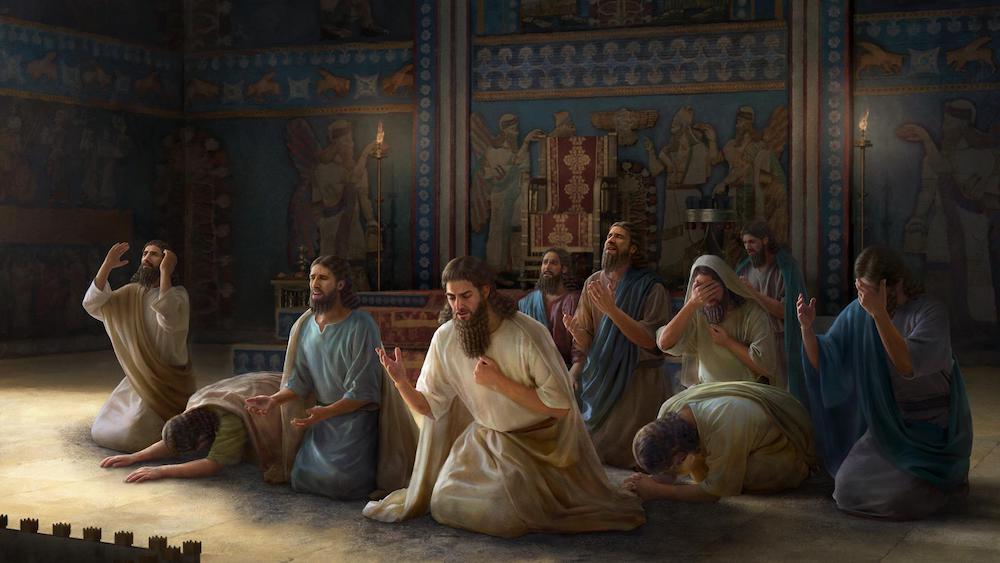The Sermon on the Mount, the Parables of the Lord Jesus and the Commandments
The Sermon on the Mount
The Beatitudes (Mat 5:3–12)
Salt and Light (Mat 5:13–16)
Law (Mat 5:17–20)
Anger (Mat 5:21–26)
Adultery (Mat 5:27–30)
Divorce (Mat 5:31–32)
Vows (Mat 5:33–37)
Eye for Eye (Mat 5:38–42)
Love Your Enemies (Mat 5:43–48)
Instruction About Giving (Mat 6:1–4)
Prayer (Mat 6:5–8)
The Parables of the Lord Jesus
The Parable of the Sower (Mat 13:1–9)
The Parable of the Tares (Mat 13:24–30)
The Parable of the Mustard Seed (Mat 13:31–32)
The Parable of the Leaven (Mat 13:33)
The Parable of the Tares Explained (Mat 13:36–43)
The Parable of the Treasure (Mat 13:44)
The Parable of the Pearl (Mat 13:45–46)
The Parable of the Net (Mat 13:47–50)
The Commandments
Mat 22:37–39 Jesus said to him, You shall love the Lord your God with all your heart, and with all your soul, and with all your mind. This is the first and great commandment. And the second is like to it, You shall love your neighbor as yourself.
Let us first look at each of the various parts of “The Sermon on the Mount.” What do all of these different parts touch upon? It can be said, with certainty, that the contents of these various parts are all more elevated, more concrete, and closer to people’s lives than the regulations of the Age of Law. To speak in modern terms, these things are more relevant to people’s actual practice.
Let us read about the following specific content: How should you understand the beatitudes? What should you know about the law? How should anger be defined? How should adulterers be dealt with? How is divorce to be spoken about, and what kind of rules are there about it? Who can get divorced and who cannot get divorced? How about vows, an eye for an eye, loving your enemies, and being charitable? And so on. All of these things relate to every aspect of the practice of mankind’s belief in God, and of their following God. Some of these practices are still applicable today, though they are shallower than what is currently required of people—they are fairly elementary truths which people encounter in their belief in God. From the time when the Lord Jesus began working, He was already beginning to carry out work on the life disposition of humans, but these aspects of His work were based on the foundation of the law. Did the rules and the ways of speaking about these topics have anything to do with the truth? Of course they did! All of the previous regulations and principles, as well as these sermons in the Age of Grace, were related to God’s disposition and what He has and is, and of course, to the truth. No matter what God expresses, and no matter what mode of expression or language He uses, the things that He expresses all have their foundation, origin, and starting point in the principles of His disposition and what He has and is. This is absolutely true. So even though these things He said seem a little shallow now, you still cannot say that they are not the truth, because they were things that were indispensable for people in the Age of Grace in order to satisfy God’s will and to achieve a change in their life disposition. Can you say that any one of these sermons is not in line with the truth? No, you cannot! Every one of them is the truth because they were all God’s requirements for mankind; they were all principles and a scope given by God, showing how one should conduct oneself, and they represent God’s disposition. However, based on the level of their growth in life at that time, these were the only things that they were able to accept and comprehend. Because mankind’s sin had not yet been resolved, these were the only words that the Lord Jesus could issue, and He could only utilize the simple teachings contained within this kind of scope to tell the people of that time how they should act, what they should do, within what principles and scope they should do things, and how they should believe in God and meet His requirements. All of this was determined based on the stature of mankind at that time. It was not easy for people living under the law to accept these teachings, so what the Lord Jesus taught had to stay within this scope.
Next, let us take a look at the various contents of “The Parables of the Lord Jesus.”
The first is the parable of the sower. This is a very interesting parable; sowing seeds is a common event in people’s lives. The second is the parable of the tares. Anyone who has planted crops, and certainly all adults, will know what “tares” are. The third is the parable of the mustard seed. All of you know what mustard is, do you not? If you do not know, you can take a look in the Bible. The fourth parable is the parable of the leaven. Now, most people know that leaven is used for fermentation, and that it is something that people use in their daily lives. The further parables, including the sixth, the parable of the treasure; the seventh, the parable of the pearl; and the eighth, the parable of the net, were all drawn and sourced from people’s real lives. What kind of picture do these parables paint? It is a picture of God becoming a normal person and living alongside mankind, using the language of life, human language, to communicate with humans and to provide them with what they need. When God became flesh and lived among mankind for a long time, after He had experienced and witnessed people’s various lifestyles, these experiences became His teaching material through which He transformed His divine language into human language. Of course, these things that He saw and heard in life also enriched the Son of man’s human experience. When He wanted people to understand some truths, to understand some of God’s will, then He could use parables similar to the ones above to tell people about God’s will and His requirements of mankind. These parables were all related to people’s lives; there was not a single one that was out of touch with human lives. When the Lord Jesus lived with mankind, He saw farmers tending their fields, and He knew what tares were and what leavening was; He understood that humans love treasure, so He used the metaphors of both the treasure and the pearl. In life, He frequently saw fishermen casting their nets; the Lord Jesus saw this and other activities related to human life, and He also experienced that kind of life. Just like every other normal human being, He experienced human daily routines and their eating three meals a day. He personally experienced the life of an average person, and observed the lives of others. When He observed and personally experienced all of this, what He thought of was not how to have a good life or how He could live more freely and comfortably. Instead, from His experiences of authentic human life, the Lord Jesus saw the hardship in people’s lives. He saw the hardship, the wretchedness, and the sadness of people living under the power of Satan and living a life of sin beneath Satan’s corruption. While He was personally experiencing human life, He also experienced how helpless people were who were living amongst corruption, and He saw and experienced the miserable conditions of humans who lived in sin, who lost all direction amidst the torture to which they were subjected by Satan and by evil. When the Lord Jesus saw these things, did He see them with His divinity or with His humanity? His humanity really existed and was very much alive; He could experience and see all of this. But of course, He also saw these things in His essence, which is His divinity. That is, Christ Himself, the Lord Jesus who was a man, saw this, and everything He saw made Him feel the importance and the necessity of the work He had taken on during this time that He lived in the flesh. Even though He Himself knew that the responsibility He needed to take on in the flesh was so immense, and He knew how cruel the pain would be which He would face, when He saw mankind helpless in sin, when He saw the wretchedness of their lives and their feeble struggles under the law, He felt more and more grieved, and became more and more anxious to save mankind from sin. No matter what kind of difficulties He would face or what kind of pain He would suffer, He became increasingly resolved to redeem mankind, who was living in sin. During this process, you could say that the Lord Jesus began to understand more and more clearly the work He needed to do and what He had been entrusted with. He also became increasingly eager to complete the work He was to take on—to assume all of mankind’s sins, to atone for mankind so that they no longer lived in sin, and at the same time, God would be able to forgive man’s sins because of the sin offering, allowing Him to continue to further His work of saving mankind. It could be said that in the Lord Jesus’ heart, He was willing to offer Himself up for mankind, to sacrifice Himself. He was also willing to act as a sin offering, to be nailed to the cross, and indeed He was eager to complete this work. When He saw the miserable conditions of human life, He wanted even more to fulfill His mission as quickly as possible, without the delay of a single minute or even a single second. Feeling such urgency, He spent no thought on how great His own pain would be, nor did He harbor any further apprehension about how much humiliation He would have to endure. He held just one conviction in His heart: As long as He offered Himself up, as long as He was nailed to the cross as a sin offering, then God’s will would be carried out and God would be able to commence new work. Mankind’s life and their state of existence in sin would be completely transformed. His conviction and what He was determined to do were related to saving man, and He had only one objective, which was to do God’s will so that God could successfully begin the next stage of His work. This was what was in the Lord Jesus’ mind at the time.
Living in the flesh, God incarnate possessed normal humanity; He had the emotions and the rationality of a normal person. He knew what happiness was, what pain was, and when He saw mankind living this kind of life, He deeply felt that merely giving people some teachings, providing them with something or teaching them something, would not be enough to lead them out of sin. Neither could just having them obey the commandments redeem them from sin—only when He took on humanity’s sin and became the likeness of sinful flesh could He win mankind’s freedom and God’s forgiveness for mankind in exchange. So after the Lord Jesus had experienced and witnessed people’s lives in sin, an intense desire manifested in His heart—to allow humans to free themselves from their lives of struggling in sin. This desire made Him feel more and more that He must go to the cross and take on humanity’s sins as soon and as quickly as possible. These were the thoughts of the Lord Jesus at that time, after He had lived with people and seen, heard, and felt the misery of their lives in sin. That the incarnate God could have this kind of will for mankind, that He could express and reveal this kind of disposition—is this something an average person could have? What would an average person see, living in this type of environment? What would they think? If an average person faced all of this, would they look at problems from an elevated perspective? Definitely not! Although the outward appearance of God incarnate is exactly the same as a human, and although He learns human knowledge and speaks human language, and sometimes even expresses His ideas through mankind’s own methods or ways of speaking, nevertheless, the way He sees humans and sees the essence of things is absolutely not the same as the way corrupt people see mankind and the essence of things. His perspective and the elevation at which He stands is something unattainable for a corrupt person. This is because God is truth, because the flesh that He wears also possesses the essence of God, and His thoughts and that which is expressed by His humanity are also the truth. For corrupt people, what He expresses in the flesh are provisions of the truth, and of life. These provisions are not just for one person, but for all of mankind. In any corrupt person’s heart, there are only those few people who are associated with them. They care and are concerned only for this handful of people. When disaster is on the horizon, they first think of their own children, spouse, or parents. At most, a more compassionate person would spare some thought for some relative or good friend, but do the thoughts of even such a compassionate person extend further than that? No, never! Because humans are, after all, humans, and they can only look at everything from the elevation and perspective of a human being. However, God incarnate is entirely different from a corrupt human. No matter how ordinary, how normal, how lowly God’s incarnate flesh is, or even with what contempt people look down on Him, His thoughts and His attitude toward mankind are things that no man could possess, that no man could imitate. He will always observe mankind from the perspective of divinity, from the elevation of His position as the Creator. He will always see mankind through the essence and the mindset of God. He absolutely cannot see mankind from the lowly elevation of an average person, or from the perspective of a corrupt person. When people look at mankind, they do so with human vision, and they use things such as human knowledge and human rules and theories as their measure. This is within the scope of what people can see with their eyes and the scope that is achievable by corrupt people. When God looks at mankind, He looks with divine vision, and He uses His essence and what He has and is as a measure. This scope includes things that people cannot see, and this is where God incarnate and corrupt humans are entirely different. This difference is determined by humans’ and God’s different essences—it is these different essences that determine their identities and positions as well as the perspective and elevation from which they see things. Do you see the expression and revelation of God Himself in the Lord Jesus? You could say that what the Lord Jesus did and said was related to His ministry and to God’s own management work, that it was all the expression and revelation of God’s essence. Although He did have a human manifestation, His divine essence and the revelation of His divinity cannot be denied. Was this human manifestation truly a manifestation of humanity? His human manifestation was, by its very essence, entirely different from the human manifestation of corrupt people. The Lord Jesus was God incarnate. If He had truly been one of the regular, corrupt people, could He have seen mankind’s life in sin from a divine perspective? Absolutely not! This is the difference between the Son of man and regular people. Corrupt people all live in sin, and when anyone sees sin, they do not have any particular feeling about it; they are all the same, just like a pig living in the mud that does not feel at all uncomfortable or dirty—on the contrary, it eats well and sleeps soundly. If someone cleans the pigsty, the pig will actually feel ill at ease, and it will not stay clean. Before long, it will once again be rolling around in the mud, completely comfortable, because it is a filthy creature. Humans see pigs as filthy, but if you clean a pig’s living quarters, it does not feel any better—this is why no one keeps a pig in their house. The way humans see pigs will always be different from how pigs themselves feel, because humans and pigs are not of the same kind. And because the incarnate Son of man is not of the same kind as corrupt humans, only God incarnate can stand at a divine perspective, at the elevation of God, from where He sees mankind and everything.
What of the suffering that God experiences when He becomes flesh and lives among mankind? What is this suffering? Does anyone truly understand? Some people say that God suffers greatly, that although He is God Himself, people do not understand His essence, but tend always to treat Him like a person, causing Him to feel aggrieved and wronged—they say that, for these reasons, God’s suffering truly is great. Other people say that God is innocent and without sin, but that He suffers in the same way as mankind, that He suffers persecution, slander, and indignities alongside mankind; they say He also endures the misunderstandings and the disobedience of His followers—thus, they say that God’s suffering truly cannot be measured. Now, it seems that you do not truly understand God. In fact, this suffering you speak of does not count as true suffering for God, because there is suffering greater than this. Then what is true suffering for God Himself? What is true suffering for God’s incarnate flesh? For God, mankind not understanding Him does not count as suffering, and neither does people having some misunderstanding of God and not seeing Him as God count as suffering. However, people often feel that God must have suffered great injustice, that during the time that God spends in the flesh, He cannot show His person to mankind and allow people to see His greatness, and that God is humbly hiding in an insignificant flesh, and that this must be a great torment for Him. People take to heart what they can understand and what they can see of God’s suffering, and project all sorts of sympathy on God and often will even offer a little praise for His suffering. In reality, there is a difference; there is a gap between what people understand of God’s suffering and what He truly feels. I am telling you the truth—for God, no matter whether it be God’s Spirit or God’s incarnate flesh, the suffering described above is not true suffering. Then what is it that God actually suffers? Let us talk about God’s suffering only from the perspective of God incarnate.
When God becomes flesh, turning into an average, normal person, living side-by-side with people among mankind, can He not see and feel people’s methods, laws, and philosophies for living? How do these methods and laws for living make Him feel? Does He feel loathing in His heart? Why would He feel loathing? What are mankind’s methods and laws for living? What principles are they rooted in? What are they based on? Mankind’s methods, laws, and so on as they relate to the way to live—all of this is created on the basis of Satan’s logic, knowledge, and philosophy. Humans living under these types of laws have no humanity, no truth—they all defy the truth and are hostile to God. If we take a look at God’s essence, we see that His essence is exactly the opposite of Satan’s logic, knowledge, and philosophy. His essence is full of righteousness, truth, and holiness, and other realities of all positive things. What does God, who possesses this essence and lives among such a mankind, feel? What does He feel in His heart? Is it not full of pain? His heart is in pain, a pain that no person can understand or experience. This is because everything that He faces, encounters, hears, sees, and experiences is all mankind’s corruption, evil, and their rebellion against and resistance to the truth. All that comes from humans is the source of His suffering. That is to say, because His essence is not the same as corrupt humans, the corruption of humans becomes the source of His greatest suffering. When God becomes flesh, is He able to find someone who shares a common language with Him? Such a person cannot be found among mankind. No one can be found who can communicate with or who can have this exchange with God—what kind of feeling would you say God has about this? The things that people discuss, love, pursue and long for all have to do with sin and evil tendencies. When God faces all of this, is it not like a knife to His heart? Faced with these things, could He have joy in His heart? Could He find consolation? Those who are living with Him are humans full of rebelliousness and evil—how could His heart not suffer? How great really is this suffering, and who cares about it? Who takes heed? And who is capable of appreciating it? People have no way of understanding God’s heart. His suffering is something that people are particularly unable to appreciate, and humanity’s coldness and numbness deepens God’s suffering even more.
There are some people who often sympathize with Christ’s plight because there is a verse in the Bible that reads: “The foxes have holes, and the birds have nests; but the Son of man has nowhere to lay His head.” When people hear this, they take it to heart and believe that this is the greatest suffering that God endures, and the greatest suffering that Christ endures. Now, looking at it from the perspective of the facts, is that the case? No; God does not believe these difficulties to be suffering. He has never cried out against injustice because of His difficulties of the flesh, and He has never made humans repay or reward Him with anything. However, when He witnesses everything about mankind and the corrupt lives and the evil of corrupt humans, when He witnesses that mankind is in Satan’s grasp and imprisoned by Satan and cannot escape, that people living in sin do not know what the truth is, He cannot tolerate all of these sins. His loathing of humans increases by the day, but He has to endure all of this. This is God’s great suffering. God cannot fully express even the voice of His heart or His emotions among His followers, and no one among His followers can truly understand His suffering. No one even tries to understand or to comfort His heart, which endures this suffering day after day, year after year, and time and time again. What do you see in all of this? God does not require anything of humans in return for what He has given, but because of God’s essence, He absolutely cannot tolerate mankind’s evil, corruption, and sin, and instead feels extreme loathing and hatred, which leads to God’s heart and His flesh enduring unending suffering. Have you seen this? Most likely, none of you could see this, because none of you can truly understand God. Over time, you should gradually experience it for yourselves.
—The Word, Vol. 2. On Knowing God. God’s Work, God’s Disposition, and God Himself III





